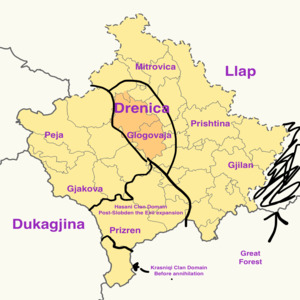Chapter 7:
Slobden The Evil Advances
“My king! My king! We just received news! The tribes in Gjakova have created a union and declared war! We have received time and place for the battle,” said the Newsbringer.
“As is expected,” said Slobden the Evil.
Currently he controlled 1/3 of the Dukagjina region. His Blitzkrieg tactics and complete annihilation of the rivaling tribes near him had scared his neighbours, and made them unite against him.
Currently the Great Army of Doom was spread out all across the Hasani Clan domain, rebuilding and laying the foundation for a growing economy.
All of the captured women and territory had been redistributed amongst his loyal soldiers.
Right now Slobden the Evil could mobilise and unite all his troops again and easily defeat the new Gjakova coalition, but he had other plans.
Instead of expanding his territory, he was focusing on developing what he already had, and started a series of economic reforms and new markets.
Firstly, he had done something that pissed off a lot of the slave-catchers in Drenica.
He started organising with mercenaries from the Llap region bordering his territory to set up slave-capturing bases near the Gjakova border, and start capturing slaves from Dukagjina territories that weren’t his own, and then selling them directly to Llap illegally.
This had many effects.
Firstly, it created a huge revenue stream for his clan which he used as capital to grow his clan’s economy.
Secondly, it greatly weakened the rival clans he was planning to invade after growing the economy.
And lastly, he had made the kingdoms of Drenica hate him for cutting them out of the slave profits he was making, and he had made the Llap kingdoms love him for offering slaves for a lower price then Drenica, and for fucking with Drenica (the Llap and Drenica kingdoms hated each other).
Traditionally Drenica had the monopoly on the slave trade through the Succession Wars, and only had to worry about slave-catchers from Llap, and not Dukagjina itself since Dukagjina was always poorly organised and divided, and slave-trading was prohibited by the tribes. But Slobden had now changed this.
But another more sinister thing Slobden the Evil had done which no one had noticed yet, was that he had eliminated the possibility of foreign intervention from Drenica and Llap during his greater expansion.
Because now, if Drenica wanted to declare war on him, Llap, his new ally, would keep Drenica in check and not allow them to invade, because Slobden was putting Drenica at a disadvantage. And from Drenica’s perspective, Slobden the Evil wasn’t worth starting a war over.
Another economic reform Slobden the Evil made was the complete deforestation of his territories.
Traditionally in the mountains, cutting down the trees was seen as disgraceful to the gods. But Slobden the Evil did not care about this.
He started massive deforestation projects, sold the lumber to Llap, again undercutting Drenica, and started farming the little arable land created through the deforestation.
He also started hunting companies on the Gjakova border to steal essential meat from his rivals, further weakening them.
And then Slobden the Evil made another unorthodox economic reform: He opened up trade to every rival tribe.
Traditionally, there was almost no trade in the Dukagjina region, and all the clans were closed off and self-sufficient. But now he allowed the rival tribes to, for example, buy back some of the meat stolen from them.
Along with the slave-catching and now this new economic reform, he further weakened his rivals, and made them vassals of sorts as well.
It was clear that Slobden the Evil was thinking very long term. And by the time he felt his territory’s economy had grown enough, he would simply march his Great Army of Doom into his weakened rivals territories, and take over.
Another economic reform was minning. It turned out his territory was very rich in natural resources, so he also grew that market, and traded materials with his Llap allies. Usually stuff like mining wasn’t done in Dukagjina because it required a lot of capital and highly-educated workers, both of which were uncommon in Dukagjina. But now Slobden the Evil had a lot of money to blow, and he had no qualms with importing skilled workers from Drenica and Llap.
And of course, with all this economic growth, he was also steadily growing the fighting power of his army.
He had already started setting up military schools in his territory. And unlike all of his ancestors, he saw the necessity of magic, and set up the first School of Magic in Dukagjina, where he even allowed rival clans send their nobility to come to study, and spread news of the wonders of the Hasani Clan.
So on the day the long Great Battle Line of the Coalition of Gjakova tribes appeared on the chosen place and date for battle, they were met by no one.
This had never happened in the history of Dukagjina. On the same day, the coalition was met with peace terms from Slobden the Evil: He promised to never attack them, and to send them a small tribute each year.
The coalition readily agreed to these terms, since they had heard stories of the Great Army of Doom, and most of them believed they couldn’t defeat him. And of course because the leaders of the coalition, who were more concerned with their self-interest than the future of their peoples, did not mind stuffing the tribute money into their pockets.
So, for the short term, there was peace in Dukagjina.
While Slobden the Evil was growing his economy and every day kept growing new markets, and creating thousands of jobs for his people.
Because of him, the average member of the Hasani Clan had grown filthy rich, and he was generally very loved by his people.
Of course, there was hatred of him for breaking all traditions and for forcing them to kill and enslave fellow Dukagjinians. But as long as their pockets were kept full and children fed, no one dared complain.











Comments (0)
See all